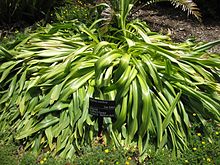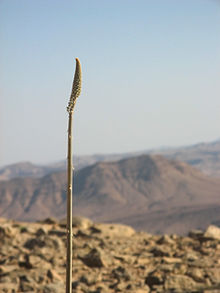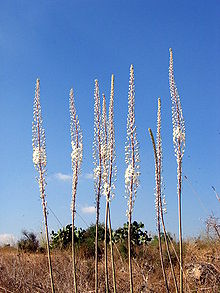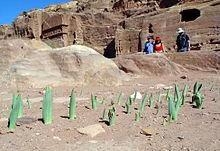- Drimia maritima
-
Drimia maritima 
Scientific classification 
Kingdom: Plantae clade: Angiosperms clade: Monocots Order: Asparagales Family: Asparagaceae Subfamily: Scilloideae Genus: Drimia Species: D. maritima Binomial name Drimia maritima
(L.) StearnThe plant Drimia maritima (syn. Urginea maritima, Urginea pancration, Urginea scilla, Scilla maritima) has the common names sea squill, red squill, sea onion, ein sit, and ada sogani. The name red squill may be reserved for a variety of the plant which has red-tinted flowers instead of the more common white. In the APG III classification system, the genus Drimia is placed in the family Asparagaceae, subfamily Scilloideae (formerly the family Hyacinthaceae[1]). In older classification systems, it was placed in the Liliaceae.
Contents
Description
Sea squill is a bulb which sends up a tall stalk topped by an inflorescence of small white flowers, followed by a rosette of large dull green leaves, that last until the following summer. The bulb can get quite large, reaching over five pounds in weight.
Habitat
This squill is native to coastal regions of the Mediterranean in sandy soil, but it is widely cultivated.
Uses
Drimia maritima has been used for medicinal purposes. The bulb contains cardiac glycosides which stimulate the heart and act as diuretics in moderate doses,[citation needed] and are emetic and poisonous in larger doses. An extract of squill is used as an ingredient in expectorant cough medicines such as buttercup syrup.[citation needed] The juice of the bulb causes blisters when put in contact with skin. The plant has been used as a rodenticide and may show promise as an insecticide. The most active chemical compounds in the plant are scillirosides, especially proscillaridine A. In the past, it has also been used as an abortifacient. This particular use is rarely seen today as it has been shown to be dangerous and largely ineffective.
More
In Israel the sea squill (Hebrew: חצב) has gained an almost iconic status, and is popularly known as the "harbinger of autumn", due to the fact that the flowers pop out all over the country at the end of the dry summer, some time before the first rain.
References
- ^ Chase, M.W.; Reveal, J.L. & Fay, M.F. (2009), "A subfamilial classification for the expanded asparagalean families Amaryllidaceae, Asparagaceae and Xanthorrhoeaceae", Botanical Journal of the Linnean Society 161 (2): 132–136, doi:10.1111/j.1095-8339.2009.00999.x
External links

This Asparagales article is a stub. You can help Wikipedia by expanding it.




